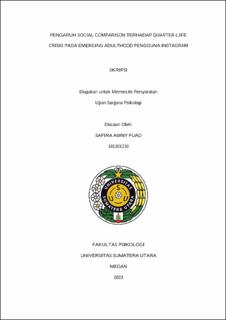| dc.description.abstract | This study aims to determine the impact of social comparison on the quarter-life
crisis in emerging adulthood using Instagram social media. This research is a
quantitative study with a correlational design. The hypothesis in this study is that
there is a significant influence between social comparison and quarter-life crisis
on the emerging adulthood of Instagram users. This study involved 384
participants aged 18-25 who used Instagram social media. This research
instrument uses the INCOM (Iowa-Netherlands Comparison Orientation
Measure) scale based on the Gibbons & Buunk theory, and the Quarter-life Crisis
scale based on the Robbins & Wilner theory. The data analysis technique in this
study used simple linear regression analysis through the IBM SPSS (Statistical
Package for Social Science) statistical program 22.0 & 25.0 versions for
Windows. The results of this study show that social comparison has a positive
effect of 39% on the quarter-life crisis, which means that the higher the level of
social comparison, the higher the quarter-life crisis among emerging adulthood of
Instagram users, and vice versa. | en_US |

